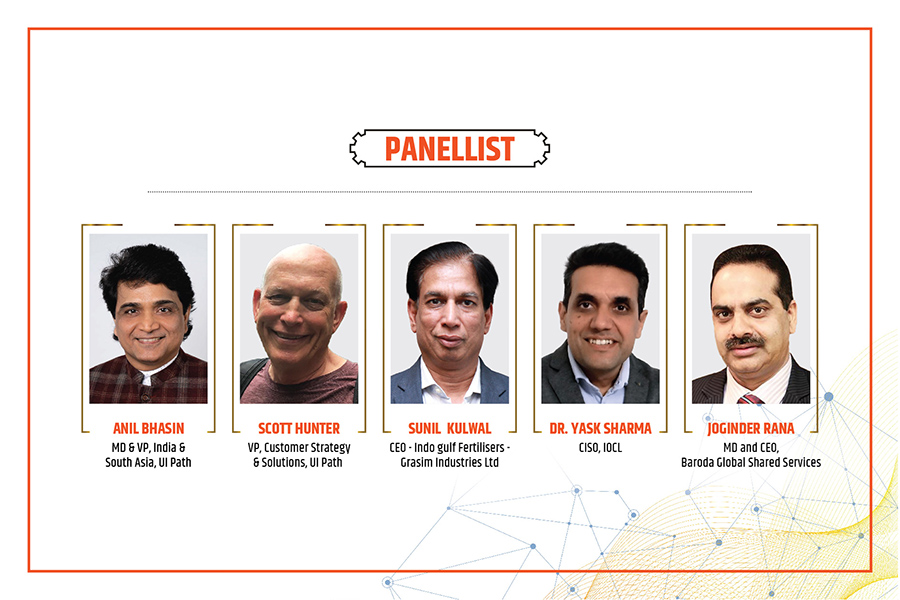Why the emerging hybrid work model needs a new Technology Stack

Over the past many years, businesses across the board have embarked on a journey towards digital transformation. With increased productivity, better efficiency, customer retention and profit maximisation as the drivers, companies have automated the business processes in their pursuit.
Yet, the journey has not been easy. While many benefits accrue due to automation, digitisation can sometimes be challenging due to legacy systems and unstructured network architecture. Also, digital transformation is not merely an exercise of adopting technology; it requires significant changes in overall functioning - right from the boardroom to the shop floor.
To understand and deliberate on the various use-cases of automation and the challenges that crop up in the journey towards digital transformation, Forbes India Influencers of Change, in partnership with UiPath, hosted a power-packed discussion featuring business leaders from different sectors.
The panellists featured in the discussion were Dr Sunil Kulwal, CEO, Indo Gulf Fertilisers (Grasim Industries Ltd), Aditya Birla Group; Joginder Rana, Managing Director and CEO, Baroda Global Shared Services; Dr Yask, CISO, IOCL; Scott Hunter, Vice President (Customer Strategy & Solutions), UiPath and Anil Bhasin, Managing Director & VP, India and South Asia, UiPath. Gautam Srinivasan of CNBC TV18 moderated the discussion.
At the start, Dr Sunil Kulwal spoke about the transformative power of digitisation in the agricultural sector. As the CEO of India's leading agri-solutions provider, he engages millions of farmers across the length and breadth of the country using the power of technology. The business engages farmers through a customer-centric approach on issues like soil testing, farmer group meetings and field days.
Spelling out the benefits of technology adoption, Dr Sunil Kulwal spoke about how "digitisation is the future of agriculture." He talked about how the COVID-19 Pandemic had caused widespread disruption and forced companies to reinvent their business processes with the aid of technology.
The agricultural sector in India can immensely benefit through effective and interactive communication. Since the farmers are knowledgeable and open to change, technology adoption can significantly aid in raising the productivity of the sector.
"During the Pandemic, we connected virtually to more than 1500 farmers across India in one go. We were able to aid them on the crop they were growing through this engagement, like how to apply nutrients, what precautions to take, etc. The response was superb," he stated.
Joginder Rana shed light on the challenges faced by the banking sector and how technology and digitisation are aiding the industry. Baroda Global Shared Services Ltd (BGSS) is a wholly-owned subsidiary of the Bank of Baroda. The company is tasked to run standardised processes and ensure high volumes of operations are carried out in a timely and accurate manner at the bank. He spoke about the need to reconcile and streamline the technology usage for cross-functional collaboration.
"The Indian banking sector is at a crossroad of digitisation. As banks adopt technology, automation aids in scaling up as per the business requirement." Using the instance of how with a well-defined technology blueprint, Bank of Baroda swiftly integrated Vijaya Bank and Dena Bank post the M&A, Joginder Rana reflected on how automation aids in increased productivity.
"Almost 95% of our customer engagements are done digitally. Automation aids in scaling up dynamically," he stated.
Yet, the road to digital transformation also poses significant challenges. One of the biggest ones is in terms of data management and data security. With a massive amount of data being generated and flowing through the network, the vulnerabilities have also increased. Dr Yask reflected on the issue of data security and data integrity. "It is indeed a big challenge for security professionals to on one side to manage and maintain the security infrastructure while adhering to cyber compliances and on the other side also to align to the business requirements, with vast amounts of data that is being generated, "he stated.
He also mentioned that it was not merely a case of securing information, but as a business leader, it is also imperative to ensure optimization and innovation in the business processes, especially from the integration of technologies like IIoT. "What is of much importance is that we make sense from all the data collected from different touchpoints. Data management is more about information management," he added.
Bringing a global perspective to the discussion, Scott Hunter spoke about how automation can quickly help businesses scale up. Using the instance of the banking sector, he talked about how technology had enabled banks to optimise processes and reduce the cycle time. "Technology can aid in making things easier, simple and sensible," he said.
For the digital transformation to be successful, it needs to be driven from the top, feels Scott Hunter. "The business transformation cycle starts from the C-level and drives all the way down with automation. By deploying best practices and use-cases, an organisation can evaluate the value of each use-case for the organisation," he added.
Reflecting on the transformative nature of digitisation, Anil Bhasin spoke about how technology integration is also a critical cultural shift. "Given the explosion around applications, living in a hybrid world where data is not just residing on-premise but also on the cloud, automation is a strategic business enabler and not a tactical necessity. Automation is the only lever that connects people, processes, and technology. Automation is meant to reduce complexities," he explained.
In the end, all the participants agreed that while the digital transformation journey is fraught with challenges, it is also imperative. The drivers towards this shift are many, from productivity gains to customer expectations. By using path-breaking technology like Artificial Intelligence, Machine Learning and Robotic Process Automation (RPA), companies can swiftly make a transition and reap the benefits of technology. Automation is the essential stepping stone on this journey. As one of the panellists mentioned, "A fully automated enterprise is a digitally transformed enterprise."
The pages slugged ‘Brand Connect’ are equivalent to advertisements and are not written and produced by Forbes India journalists.



